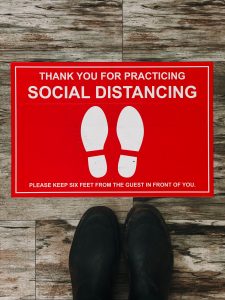- Social Grace & COVID-19 lineups - April 26, 2020

By Tiffany Wooster
Is COVID-19 causing people to drop manners and be verbally abusive to maintain social distancing? During this lockdown, routine activities like going to the post office, grocery shopping, and visiting the gas station are suddenly charged with new tensions and stressors. Is the faltering social etiquette an indication of society’s deteriorating mental health brought on by the coronavirus pandemic?
Common courtesy seems to be a thing of the past. While visiting the post office last week, 75-year-old Gail Ackels experienced a customer verbally “blow-up’ at her when she was selecting a shipping form from the kiosk beside where he was standing. The customer didn’t say, “excuse me, would you please back up, I’m trying to maintain social distancing.’ He instead burst out in a verbally abusive rage shouting for her to stay 6 feet away. This behavior was shocking for Ackels and caused her to fear that she might be attacked.
The coronavirus has turned etiquette on its head. What once were gestures of friendship, kindness, or merely walking by, are now acts of aggression. Until last month, society used to run on the idea that we were all welcome in one another’s space. Now civility amounts to how much distance we keep between ourselves and how much we shield others from our presence. The fear of catching COVID-19 might be worse for society than the actual disease if we allow the fear of catching coronavirus to overtake all our societal manners.
The CDC (Center for Disease Control) explains Social distancing, also called “physical distancing,’ as “…keeping space between yourself and other people outside of your home. To practice social or physical distancing: stay at least 6 feet from other people; do not gather in groups; stay out of crowded places and avoid mass gatherings.’
Why practice social distancing? The CDC states, “COVID-19 spreads mainly among people who are in close contact (within about 6 feet) for a prolonged period. Spread happens when an infected person coughs, sneezes, or talks, and droplets from their mouth or nose are launched into the air and land in the mouths or noses of people nearby. The droplets can also be inhaled into the lungs.’ There are no CDC guidelines reminding people not to be willfully insensitive by damaging the mental health of seniors by angrily shouting to remind them to maintain recommended social distancing.
“The outbreak of coronavirus disease 2019 (COVID-19) may be stressful for people,” CDC warns. “Fear and anxiety about a disease can be overwhelming and cause strong emotions in adults and children. Coping with stress will make you, the people you care about, and your community stronger’ but doesn’t offer any solutions or societal guidelines for expected behavior except to “call your mental health care practitioner.’

Fred Wilkinson, who is in his 80s, experienced the COVID-19 lack of courtesy when he was shopping at Costco two days ago. A woman sharply barked at him to move back when Fred stepped within 6-feet of her while waiting in line to check out. This treatment caused Fred to feel even more fearful of shopping for groceries outside of the normal virus fear. He says he doesn’t want to “walk on eggshells’ whenever he shops, fearing a verbal attack.
Del Ackels, 78, also experienced someone being rude to him while paying for gas last week. Ackels does not hear well, and when he leaned in to ask the convenience store attendant to repeat what he said, the attendant rudely took a step back and told him to back off. Ackels says, “It’s important to not verbally attack and insult one another in situations that are not that endangering. There is no excuse for that kind of narcissistic behavior. A polite reminder to create distance will be fine.’
Ackels adds, “People need to understand if someone is crossing within six feet of your personal space it’s not life or death, so, therefore, having respect and courtesy for others still matters. The fear of catching COVID-19 might be worse for society than the actual disease if we allow the fear of catching coronavirus to overtake all our societal manners. Courtesy has never been more serious. It is how we can tell our society is still functioning.”

Tiffany Wooster is a non-traditional student at UAF majoring in film and theater production with a minor in journalism. She plans on attending law school in the next few years. She is young for her species.
